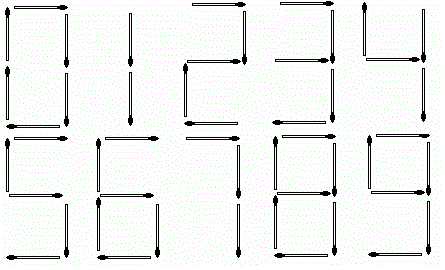PROBLEM LINK:
Setter: Hasan
Tester: Roman Bilyi
Editorialist: Taranpreet Singh
DIFFICULTY:
Cakewalk
PREREQUISITES:
None
PROBLEM:
Given two values A and B, Find the number of matches required to write S = A+B as explained in the problem statement.
EXPLANATION
Since matches used for each digit is independent, we just need to write each digit of A+B separately and count the number of matches required for each digit. From the image

We can see that 6 matches are needed to write 0 on display, 2 matches are needed to write 1 on display and so on. We can count this for all digits and store it in an array, say count. count[x] denotes the number of matches required to write digit x on display.
Now, to obtain digits of S = A+B, we can see that taking remainder by 10 gives the last digit of S and dividing S by 10 removes the last digit. These two observations give us a way to get all digits of S.
while S > 0:
D = S%10 //D is the least significant digit of S
ANS = ANS + count[D]
S = S/10 //Least significant digit is discarded
Bonus problem
Count the number of Matches needed to write A+B in base x using matches where 2 \leq x \leq 10
TIME COMPLEXITY
For each test case, time taken is the number of digits of A+B in base 10, which is log_{10}(A+B), so time complexity per test case is O(log_{10}(A+B))
SOLUTIONS:
Setter's Solution
#include <iostream>
#include <algorithm>
#include <string>
#include <assert.h>
using namespace std;
long long readInt(long long l,long long r,char endd){
long long x=0;
int cnt=0;
int fi=-1;
bool is_neg=false;
while(true){
char g=getchar();
if(g=='-'){
assert(fi==-1);
is_neg=true;
continue;
}
if('0'<=g && g<='9'){
x*=10;
x+=g-'0';
if(cnt==0){
fi=g-'0';
}
cnt++;
assert(fi!=0 || cnt==1);
assert(fi!=0 || is_neg==false);
assert(!(cnt>19 || ( cnt==19 && fi>1) ));
} else if(g==endd){
assert(cnt>0);
if(is_neg){
x= -x;
}
assert(l<=x && x<=r);
return x;
} else {
assert(false);
}
}
}
string readString(int l,int r,char endd){
string ret="";
int cnt=0;
while(true){
char g=getchar();
assert(g!=-1);
if(g==endd){
break;
}
cnt++;
ret+=g;
}
assert(l<=cnt && cnt<=r);
return ret;
}
long long readIntSp(long long l,long long r){
return readInt(l,r,' ');
}
long long readIntLn(long long l,long long r){
return readInt(l,r,'\n');
}
string readStringLn(int l,int r){
return readString(l,r,'\n');
}
string readStringSp(int l,int r){
return readString(l,r,' ');
}
int T;
int A,B;
int num[10]={6,2,5,5,4,5,6,3,7,6};
int main(){
//freopen("00.txt","r",stdin);
//freopen("00o.txt","w",stdout);
T=readIntLn(1,1000);
while(T--){
A=readIntSp(1,1000000);
B=readIntLn(1,1000000);
int s= A+B;
int ans = 0;
while(s>0){
ans += num[s % 10];
s /= 10;
}
cout<<ans<<endl;
}
assert(getchar()==-1);
}
Tester's Solution
#include "bits/stdc++.h"
#pragma GCC optimize("Ofast")
#pragma GCC target("sse,sse2,sse3,ssse3,sse4,avx,avx2")
using namespace std;
#define FOR(i,a,b) for (int i = (a); i < (b); i++)
#define RFOR(i,b,a) for (int i = (b) - 1; i >= (a); i--)
#define ITER(it,a) for (__typeof(a.begin()) it = a.begin(); it != a.end(); it++)
#define FILL(a,value) memset(a, value, sizeof(a))
#define SZ(a) (int)a.size()
#define ALL(a) a.begin(), a.end()
#define PB push_back
#define MP make_pair
typedef long long Int;
typedef vector<int> VI;
typedef pair<int, int> PII;
const double PI = acos(-1.0);
const int INF = 1000 * 1000 * 1000;
const Int LINF = INF * (Int) INF;
const int MAX = 100007;
const int MOD = 1000000007;
const double Pi = acos(-1.0);
int d[] = {6, 2, 5, 5, 4, 5, 6, 3, 7, 6};
int f(int x)
{
int res = 0;
while(x)
{
res += d[x % 10];
x /= 10;
}
return res;
}
int main(int argc, char* argv[])
{
// freopen("in.txt", "r", stdin);
//ios::sync_with_stdio(false); cin.tie(0);
int t;
cin >> t;
assert(t <= 1000);
FOR(tt,0,t) {
int a, b;
cin >> a >> b;
assert(a >= 1 && a <= 1000000);
assert(b >= 1 && b <= 1000000);
cout << f(a + b) << endl;
}
cerr << 1.0 * clock() / CLOCKS_PER_SEC << endl;
}
Editorialist's Solution
import java.util.*;
import java.io.*;
import java.text.*;
class MATCHES{
//SOLUTION BEGIN
int[] mp = new int[]{6, 2, 5, 5, 4, 5, 6, 3, 7, 6};
void pre() throws Exception{}
void solve(int TC) throws Exception{
int s = ni()+ni(), ans = 0;
while(s>0){
ans+=mp[s%10];
s/=10;
}
pn(ans);
}
//SOLUTION END
void hold(boolean b)throws Exception{if(!b)throw new Exception("Hold right there, Sparky!");}
DecimalFormat df = new DecimalFormat("0.00000000000");
static boolean multipleTC = true;
FastReader in;PrintWriter out;
void run() throws Exception{
in = new FastReader();
out = new PrintWriter(System.out);
//Solution Credits: Taranpreet Singh
int T = (multipleTC)?ni():1;
pre();for(int t = 1; t<= T; t++)solve(t);
out.flush();
out.close();
}
public static void main(String[] args) throws Exception{
new MATCHES().run();
}
int bit(long n){return (n==0)?0:(1+bit(n&(n-1)));}
void p(Object o){out.print(o);}
void pn(Object o){out.println(o);}
void pni(Object o){out.println(o);out.flush();}
String n()throws Exception{return in.next();}
String nln()throws Exception{return in.nextLine();}
int ni()throws Exception{return Integer.parseInt(in.next());}
long nl()throws Exception{return Long.parseLong(in.next());}
double nd()throws Exception{return Double.parseDouble(in.next());}
class FastReader{
BufferedReader br;
StringTokenizer st;
public FastReader(){
br = new BufferedReader(new InputStreamReader(System.in));
}
public FastReader(String s) throws Exception{
br = new BufferedReader(new FileReader(s));
}
String next() throws Exception{
while (st == null || !st.hasMoreElements()){
try{
st = new StringTokenizer(br.readLine());
}catch (IOException e){
throw new Exception(e.toString());
}
}
return st.nextToken();
}
String nextLine() throws Exception{
String str = "";
try{
str = br.readLine();
}catch (IOException e){
throw new Exception(e.toString());
}
return str;
}
}
}
Feel free to share your approach, if you want to. (even if its same ![]() ) . Suggestions are welcomed as always had been.
) . Suggestions are welcomed as always had been. ![]()



